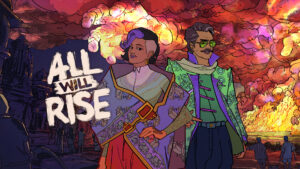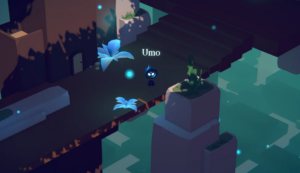
After a successful run last fall, Flora Roberts, Laura op de Beke, and Stefan Werning, representing the Network for Environmental Humanities (NEH) and the Utrecht Game Lab, are back with another series of ecogame play(testing) sessions.
This season we will return to some of the same themes and (game)genres covered last year, though we will bring new titles to the table and hopefully some new insights as well. Moreover, in this, our second run, we also aspire to do more playful tinkering with games, trying our hand at ‘hacking’ or modifying them to understand how games make procedural arguments about socio-ecological processes–like climate change, biodiversity loss, or the energy transition.
Please let us know if you want to join us, and we’ll make sure there is pizza for dinner. Sign up by putting your name down here.
WHEN: 2nd Tuesdays of the month, 17:15-21:00 (October is the exception)
WHERE: University Library 0.21 (wheelchair accessible + open to the public), unless otherwise specified.

September 9: BYOG
To start the series we’re asking you to bring the (eco)games you have, lying around. For instance, we are eager to give Greenworld a try, which is a kind of environmentalist trivial pursuit from 1991 (and a great charity shop find by Laura). We’re interested to find out how its trivia has aged, and what knowledge is deemed valuable by the game for use in the environmentalist movement.
While we certainly intend to play the games you bring to the table, this session also hopes to spark a more general discussion about our experiences with ecogames so far: their strengths, their weaknesses, and their idiosyncrasies. What do ecogames look like in 2025, and what are some themes and mechanics that we want to explore the coming term?
(Tuesday) October 14: Ecological Monsters
In the spookiest month of the year we will play tabletop role-playing games, or TTRPGs, in which ecosystems are imagined as monstrous—or, in which players themselves have to entertain dark thoughts and urges.
- Mouth Brood: a game of exploration that asks players to draw and catalogue a disturbing alien ecology in which everything–yes everything–eats each other.
- Mystery Flesh Pit National Park: in the 1970s in Texas oil prospectors discovered an enormous subterranean organism of indeterminate size and origin embedded deep within the earth, which they promptly started to exploit for commercial gain. Play to discover the horrors of this fascinating geobiological venture. (DM’d by Laura op de Beke).
- Octopolis: in this collaborative city building/map drawing game you’re building a city as and for octopus. Time for some tentacular thinking.
- Reduce, Reuse, Revolt: This is a role-playing game about ‘eco-terrorists’ that asks players to plan an act of eco-sabotage. How far are you willing to go to defend the Earth?
- Werewolf: The Apocalypse: Another game of Eco-sabotage, but with werewolves!
November 11: Synergies and Tipping Points
Note: this session will be held in the Thielezaal, at the university library (up the stairs from where we usually meet).
In this session we are embracing complexity and sitting down for some longer, more challenging boardgames, including last year’s crowd favorite Daybreak.
- Daybreak: a co-operative game about climate action in which cards represent real-life, innovative environmental policies. What cards will you (or can you) play to achieve negative emissions?
- Earth: a (card) tableau builder with simple rules and near-infinite number of combinations. Every single game will allow you to discover new synergies and connections, just as our vast and fascinating world allows us to do!
- Ecosfera: a cooperative deck-building game much like Earth, with different levels of difficulty where we must restore nature before it’s too late.
- Links: a narrative-driven analogue game exploring how social, environmental, economic, and cultural forces collide in the age of the climate crisis.
- Terraforming Mars: Compete with rival CEOs to make Mars habitable and build your corporate empire!
Note that on 18 November, Utrecht will host Dutch DiGRA, a game studies symposium. Anybody interested in the academic study of games is very welcome to attend. While we might ask you for a small fee to cover tea/coffee, the event is otherwise free of charge, and a great opportunity to network.
December 9: Hacking Boardgames
It might be decades since you’ve last played Monopoly, The Game of Life, or the Game of the Goose, but we bet you still remember the rules… You’ll need to for this session, in which––armed with scissors, gluesticks, and other crafting supplies––we will breathe new life into these classic boardgames. Through clever narrative, procedural or graphical interventions, we invite you to twist, subvert, or alter these games in order to make them speak more accurately and provocatively to the strained relationship between people and the environment.
January 13: Game Design Ethos and Manifestos (postponed, new date TBA)
To fill the echoey depths of January, a month of writing, grading and exam prep, we will meet for a more theoretical activity. In this session, instead of games, we will discuss game design ethos and manifestos. Participants are invited to read any (or all?!) of the articles/manifestos below. With your permission, we will call on you to briefly present the design ethos to facilitate a discussion on how these design philosophies align with environmental concepts and values.
- Rambunctious games: Chang, Alenda. 2020. “Rambunctious Games: A Manifesto for Environmental Game Design.” Art Journal 79 (2): 68–75.
- Belonging outside of belonging: https://buriedwithoutceremony.com/belonging
- Games Omnivorous: https://gamesomnivorous.com/collections/manifestus-omnivorous
- Solarpunk Manifesto: https://www.re-des.org/es/a-solarpunk-manifesto/
- Turku School larp manifesto: https://nordiclarp.org/w/images/8/80/2014_The_Foundation_Stone_of_Nordic_Larp.pdf#page=295




